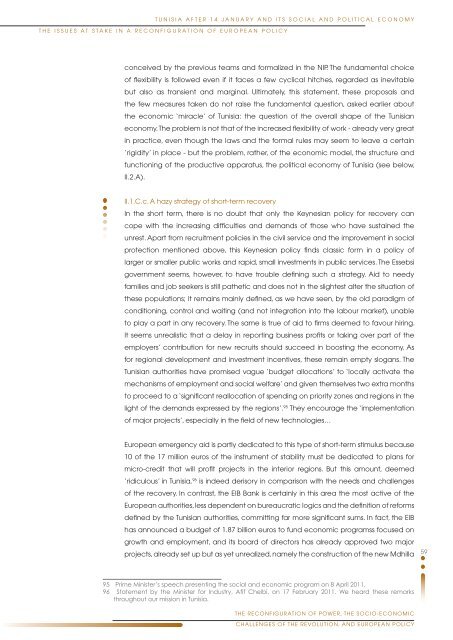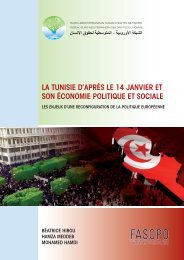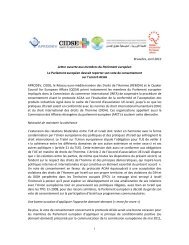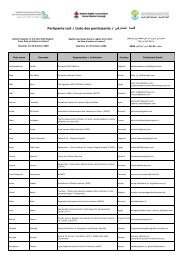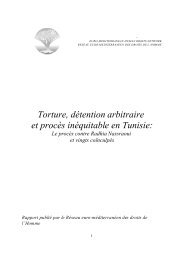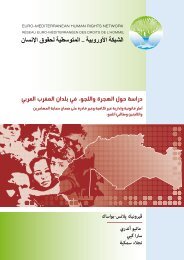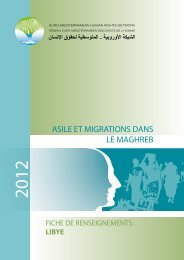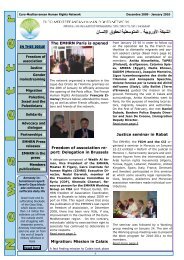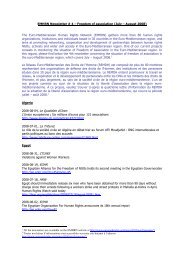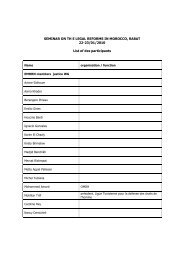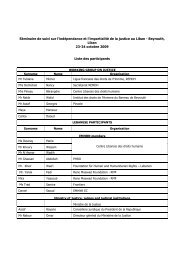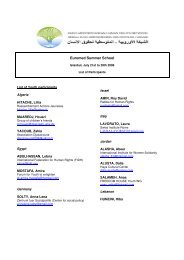tunisia after 14 january and its social and political economy - Refworld
tunisia after 14 january and its social and political economy - Refworld
tunisia after 14 january and its social and political economy - Refworld
You also want an ePaper? Increase the reach of your titles
YUMPU automatically turns print PDFs into web optimized ePapers that Google loves.
T U N I S I A A F T E R 1 4 J A N U A R Y A N D I T S S O C I A L A N D P O L I T I C A L E C O N O M YT H E I S S U E S A T S T A K E I N A R E C O N F I G U R A T I O N O F E U R O P E A N P O L I C Yconceived by the previous teams <strong>and</strong> formalized in the NIP. The fundamental choiceof flexibility is followed even if it faces a few cyclical hitches, regarded as inevitablebut also as transient <strong>and</strong> marginal. Ultimately, this statement, these proposals <strong>and</strong>the few measures taken do not raise the fundamental question, asked earlier aboutthe economic ‘miracle’ of Tunisia: the question of the overall shape of the Tunisian<strong>economy</strong>. The problem is not that of the increased flexibility of work - already very greatin practice, even though the laws <strong>and</strong> the formal rules may seem to leave a certain‘rigidity’ in place - but the problem, rather, of the economic model, the structure <strong>and</strong>functioning of the productive apparatus, the <strong>political</strong> <strong>economy</strong> of Tunisia (see below,II.2.A).II.1.C.c. A hazy strategy of short-term recoveryIn the short term, there is no doubt that only the Keynesian policy for recovery cancope with the increasing difficulties <strong>and</strong> dem<strong>and</strong>s of those who have sustained theunrest. Apart from recruitment policies in the civil service <strong>and</strong> the improvement in <strong>social</strong>protection mentioned above, this Keynesian policy finds classic form in a policy oflarger or smaller public works <strong>and</strong> rapid, small investments in public services. The Essebsigovernment seems, however, to have trouble defining such a strategy. Aid to needyfamilies <strong>and</strong> job seekers is still pathetic <strong>and</strong> does not in the slightest alter the situation ofthese populations; it remains mainly defined, as we have seen, by the old paradigm ofconditioning, control <strong>and</strong> waiting (<strong>and</strong> not integration into the labour market), unableto play a part in any recovery. The same is true of aid to firms deemed to favour hiring.It seems unrealistic that a delay in reporting business prof<strong>its</strong> or taking over part of theemployers’ contribution for new recru<strong>its</strong> should succeed in boosting the <strong>economy</strong>. Asfor regional development <strong>and</strong> investment incentives, these remain empty slogans. TheTunisian authorities have promised vague ‘budget allocations’ to ‘locally activate themechanisms of employment <strong>and</strong> <strong>social</strong> welfare’ <strong>and</strong> given themselves two extra monthsto proceed to a ‘significant reallocation of spending on priority zones <strong>and</strong> regions in thelight of the dem<strong>and</strong>s expressed by the regions’. 95 They encourage the ‘implementationof major projects’, especially in the field of new technologies…European emergency aid is partly dedicated to this type of short-term stimulus because10 of the 17 million euros of the instrument of stability must be dedicated to plans formicro-credit that will profit projects in the interior regions. But this amount, deemed‘ridiculous’ in Tunisia, 96 is indeed derisory in comparison with the needs <strong>and</strong> challengesof the recovery. In contrast, the EIB Bank is certainly in this area the most active of theEuropean authorities, less dependent on bureaucratic logics <strong>and</strong> the definition of reformsdefined by the Tunisian authorities, committing far more significant sums. In fact, the EIBhas announced a budget of 1.87 billion euros to fund economic programss focused ongrowth <strong>and</strong> employment, <strong>and</strong> <strong>its</strong> board of directors has already approved two majorprojects, already set up but as yet unrealized, namely the construction of the new Mdhilla5995 Prime Minister’s speech presenting the <strong>social</strong> <strong>and</strong> economic program on 8 April 2011.96 Statement by the Minister for Industry, Afif Chelbi, on 17 February 2011. We heard these remarksthroughout our mission in Tunisia.The reconfiguration of power, the socio-economicchallenges of the revolution, <strong>and</strong> European policy


